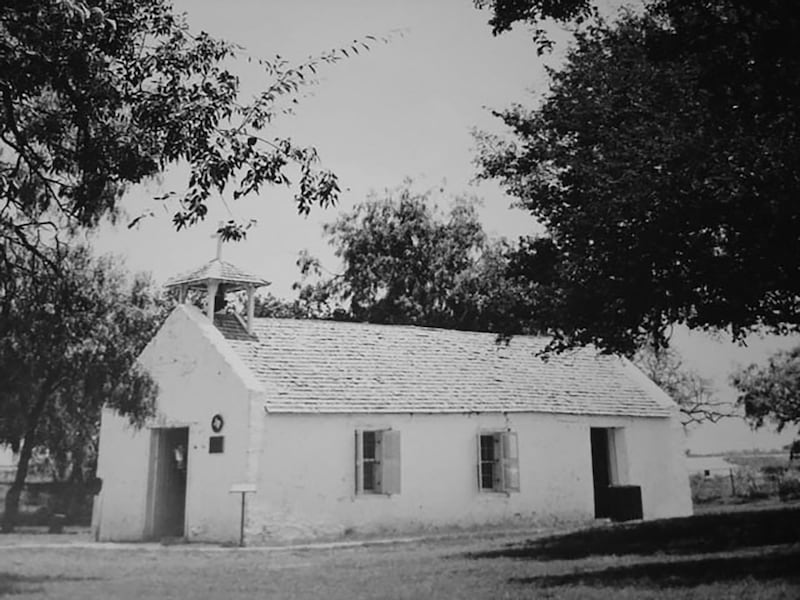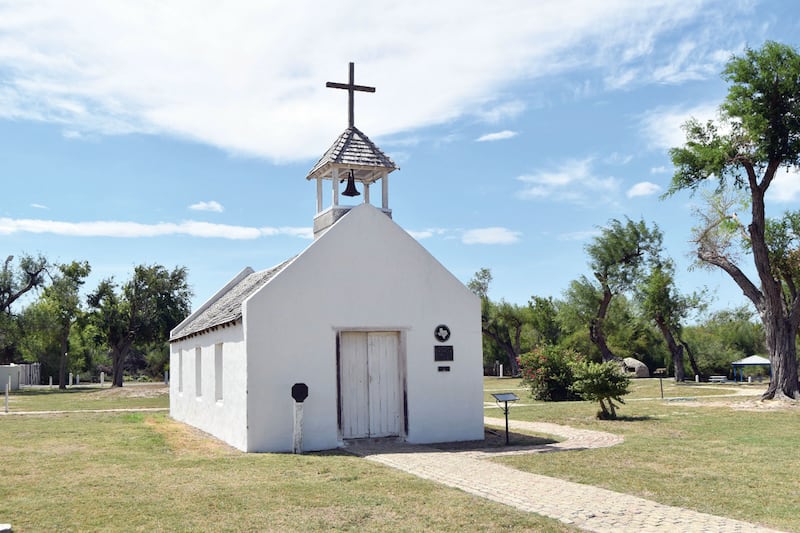About 800 feet from the border, near a horseshoe bend in the Rio Grande separating the United States from Mexico, is the historic La Lomita Chapel.
The Catholic chapel, built in 1899 in Mission, Texas, is a white stone and wood single-room structure in the middle of an open field. It is now a tourist attraction because of its rich history as a site where Calvary of Christ missionaries performed baptisms, marriages, and funerals.
“Everybody sees this as our mother church and it’s forever sacred in our memory," Father Roy Snipes, a 73-year-old clergyman who leads a nearby Catholic church, told The Daily Beast on Wednesday.
“It’s the heart of our community,” he said. “It’s like a second home to me.”
But now the Trump administration wants to seize it to make way for the president’s border wall.
“They are trying to bully us but we are not backing down,” said Snipes, who made his final vows nearly four decades ago at La Lomita. “The wall goes against our beliefs as Catholics and as Texans. We refuse to let them bulldoze our church for something that will harm people in need.”
The 400 square-foot church, no longer in service, has ten crude pew benches on both sides of the church facing an altar dominated by a large picture of Our Lady of Guadalupe. Outside, over its sole entrance, a shingled roof supports a wooden bell tower and a single silver cross.
La Lomita Chapel, which means “Little Hill” in Spanish, is an integral part of Mission, a border town of 84,000 where 85 percent of the population is Catholic (the highest concentration in the United States, according to the church). “When the City of Mission, Texas was founded in 1908, the city was named ‘Mission’ in honor of La Lomita Chapel,” the city’s website explains. “Now, La Lomita Chapel is a religious shrine and a favorite site of historians that provides a glimpse into an important part of the history of Mission and South Texas in general.”

In a number of small towns along the Texas border, the Trump administration has filed court notices demanding “immediate possession” of privately owned land for possible sites to construct “fencing, vehicle barriers, security lighting, cameras, sensors, and related structures to help secure the United States/Mexico border,” according to court documents.
But the Trump administration’s plan to build part of the border wall through the historic mission site in Hidalgo County would be an intrusion on religious freedom, the Diocese of Brownsville says.
“It goes against the First Amendment, freedom of religion," David Garza, a Brownsville lawyer representing the diocese, told The Daily Beast on Tuesday.
“The idea of denying asylum-seekers goes against their faith. So this fight is more than just defending their land. It’s about defending their religion.”
As one of the five border dioceses, Brownsville has a history of servicing Catholics regardless of their immigration status. If the wall is erected next to La Lomita and its surrounding churches, Customs and Border Patrol officials could monitor and interrogate churchgoers on their immigration status, thus violating their First Amendment rights, the diocese argued.
“For some worshippers, the need to pass through the border wall to reach La Lomita will deter them from their religious practices,” court documents said. “Some local Catholics are undocumented and therefore would fear being unable to return to the north side of the wall if stopped by CBP.”
Father Snipes said the wall represents a “hostile stance” and opposing it is not about politics, it’s about the gospel.
“Our community message has always been ‘Come on in, we’re trying to make you feel at home,’” he said. “But walling out our neighbors on the south side is just as sacrilegious as keeping us from our sacred shrine.”
On Oct. 25, the government filed a “Declaration of Taking” motion to notify Diocese and Bishop Daniel Flores, who has led the diocese since 2009, of its intention to survey and potentially seize two properties in Hidalgo County, or about about 67 acres of church land, including La Lomita.
A day after the filing, Bishop Flores, a vocal advocate for immigrant rights, formally objected to the government’s request to gain access, calling it an “infringement on the religious freedoms of the La Lomita Chapel.”
“Any barrier that prevents victims of government tyranny, gang violence, domestic abuse, or any persecution from seeking refuge cannot be reconciled with Catholic moral and doctrinal teaching,” Flores told The Daily Beast on Wednesday. “Our church property should not be used for something that goes against its mission. We are pushing back.”
One month later, however, the government asked a federal judge for “immediate possession” of the properties.
“Time is of the essence,” read a federal document filed in the Southern District of Texas on Nov. 22. “The United States needs immediate possession of the subject property in order to meet this congressional directive."
On New Year’s Eve, the defiant diocese filed yet another motion against the government, the day before a deadline imposed by the federal judge. The motion outlined the church’s belief that the wall and the government’s interest in church-owned land would go against the church’s religious freedom and destroy the rich history of the border town.
“The proposed border wall is fundamentally inconsistent with Catholic values and, if completed, would substantially burden the free exercise of religion,” the motion said, adding that “La Lomita Chapel remains an integral part of Catholic life in Mission and the Valley as a whole.”
The diocese also noted that, despite countless attempts to receive clarification, U.S. Customs and Border Protection have yet to determine whether La Lomita Chapel would be demolished to accommodate the proposed wall’s 150-foot enforcement zone, court documents show.
“CBP has represented in other informal conversations with community members that La Lomita will not be removed, and that there will be a gate in the border wall to allow access [to] the chapel, although the Government has not provided any official confirmation of its plans,” read the filing.
According to court documents, CBP’s plans call for all grass and trees around the historic chapel to be removed and replaced with lighting and surveillance equipment, effectively destroying the spiritual environment for parishioners.
“Because of La Lomita’s connections to the missionary history of the Valley, the chapel’s humble size and trappings, and its peaceful setting, many find the chapel to be a place where they feel the presence of God,” the court filing said.
While the Brownsville Diocese is hopeful, Bishop Flores said, they are aware that if the government determines the land is needed to construct the wall, the chapel will most likely be expropriated.
“We made our case why we believe it is out of the federal government’s powers to take away our land and potentially remove La Lomita,” the bishop, who was born and raised in Texas, said.
Flores was one of eight bishops who publicly opposed last year’s National Guard deployment to the border over fears of a caravan of asylum-seeking migrants.
“It does not matter how much we fight the government and ask them to go away—if they want our land they will take our land,” he said. “We just want a fighting chance to stand by our religious beliefs and our constitutional rights.”
The fight over church lands began with President Trump’s executive order, signed five days after he took office, directing federal authorities to “secure the southern border of the United States through the immediate construction of a physical wall... so as to prevent illegal immigration, drug and human trafficking, and acts of terrorism.”
Because of this directive, the feds claim, the government needs to take control of the church-owned land “for at least a year” while it decides whether to permanently make the property part of the wall’s path “without interfering with or abridging the rights” of the diocese.
As the government shutdown wraps up its third week—leaving airport security in chaos and the national parks littered in its wake—President Trump is still standing by his word: There will be no compromise until he gets his border wall.
The wall, meant to combat the “crisis at the southern border,” was again pitched Tuesday evening in a nationally broadcast Oval Office address before Trump heads to the border to make his case in-person.
“Every day, Customs and Border Patrol agents encounter thousands of illegal immigrants trying to enter our country,” Trump said. “All Americans are hurt by uncontrolled illegal migration.”
Democratic lawmakers have steadfastly refused a deal that will include the multi-billion-dollar partition to block immigrants at the southern border. And border-town locals like Bishop Flores have no intention of backing down either.
“This has nothing to do with the brave men and women who protect our border, or even our president. We are not trying to assign blame to the problem,” Flores said. “We just want to opt out of participating in this governmental issue and protect the mission.”
Despite the religious and historic significance of La Lomita, however, Flores fears the initial survey will serve as a “formality” before the government ultimately seizes the land through eminent domain.
“We’ve got a tough uphill battle,” Garza said. “Eminent domain cases are hard to win, whether it’s for a dam, to widen a highway, or to build the wall.”
The U.S. Conference of Catholic Bishops, a national arm of the Catholic Church, told The Daily Beast on Wednesday that it supports the Diocese of Brownsville’s decision to fight the government’s request for land and their “fight for Catholic ideals.”
“We support their fight and have offered our assistance to the diocese if they need it,” a spokesperson for the organization said.
A CBP spokesperson declined to comment because of ongoing litigation and John A. Smith III, the assistant U.S. attorney representing the government, told The Daily Beast similar efforts to obtain land to survey along the border have been met with little opposition.
While Brownsville Diocese fights to maintain its autonomy and religious freedom, others have already fallen to Trump’s demands.
More than 100 property owners in Hidalgo County have allowed the federal government to survey their land for the border wall, including Pharr Oratory of St. Philip Neri, a congregation of Catholic priests.
The Oratory, which owns 26 acres along the Rio Grande, originally refused to cooperate and fought a similar legal battle. In September, Garza, who also represented the oratory, filed a claim that the government’s request for land “interrupted the Freedom of Religion for the priests and seminarian living on the property.”
“It was the same case we are fighting now,” Garza said. “The Oratory felt their rights were being violated, and their lives uprooted, so we decided to fight.”

In December, however, a federal judge sided with the government, granting them permission to conduct a survey on the oratory’s land.
“I can’t see that it is a substantial burden at all,” U.S. District Judge Randy Crane said in court in December. “It seems, at this point, a rather trivial intrusion.” Pharr Oratory of St. Philip Neri did not respond to The Daily Beast’s request for comment.
Bishop Flores told The Daily Beast that while the oratory’s efforts were unsuccessful, his legal team have learned from the case and plan to use newer tactics to fight the government.
The loss of another church’s land, he said, only fuels the diocese’s mission to fight harder.
“A wall is inhumane and creates this mentality of ‘us’ and ‘them’ and already cost one Catholic community their land,” the bishop said.
On Wednesday, a federal judge granted the government’s motion for a Feb. 6 hearing with the Diocese of Brownsville in McAllen, Texas, Garza confirmed.
“The fight is about to pick back up again,” he said.
—Adam Rawnsley contributed reporting.






